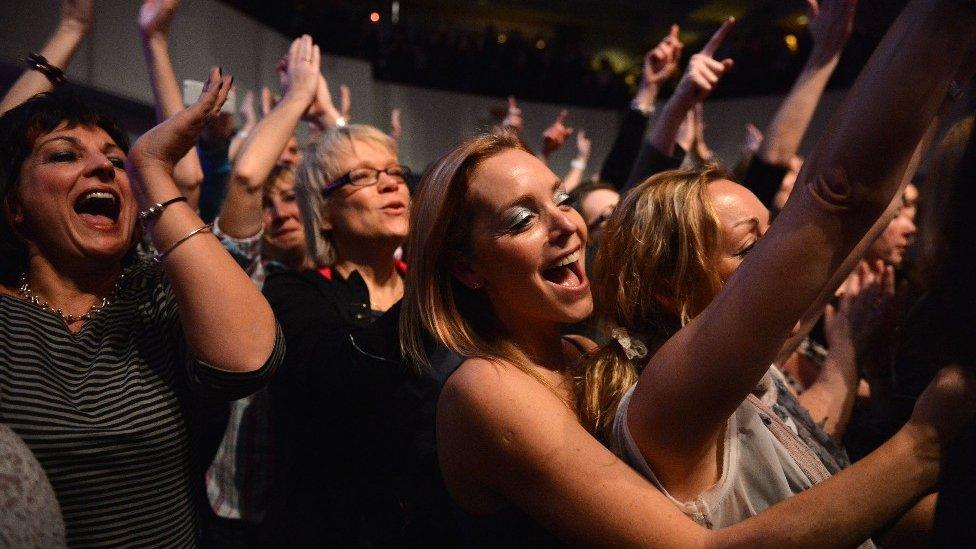Grassroots live music venues suffer 'most challenging year', report says
- Published
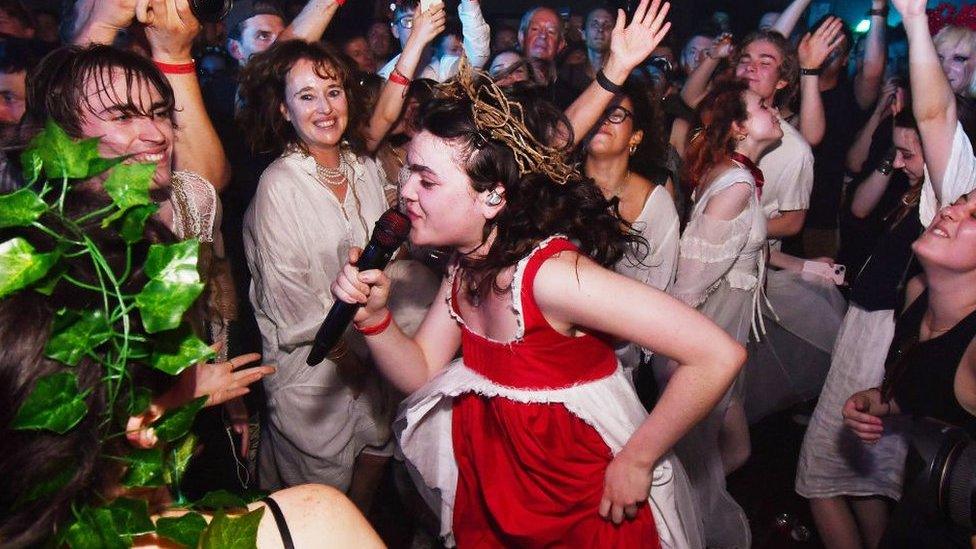
BBC Radio 1 Sound of 2024 winners The Last Dinner Party, fronted by Abigail Morris, made their name in grassroots venues
Grassroots music venues, which offer a vital launchpad for fledgling acts, risk closure, new research warns.
The Music Venues Trust (MVT) said financial stresses led 125 UK venues to abandon live music in 2023, with over half of these shutting entirely.
Soaring utility bills and an average 37.5% rent hike put the surviving 835 venues at risk, which typically secured profits of just 0.5%, MVT said.
It was the sector's "most challenging year" of the past decade, it added.
Their annual report found the grassroots scene remains "significantly underfunded compared to other areas of culture", despite contributing over £500m to the economy and employing almost 30,000 people.
Calls to the charity's emergency crisis line, which offers financial and legal support, increased by 38% as losses soared.
Venues solely dedicated to live music were among the hardest hit, facing an average shortfall of £137,501 over the past year despite fans typically paying higher ticket prices and spending more per head.
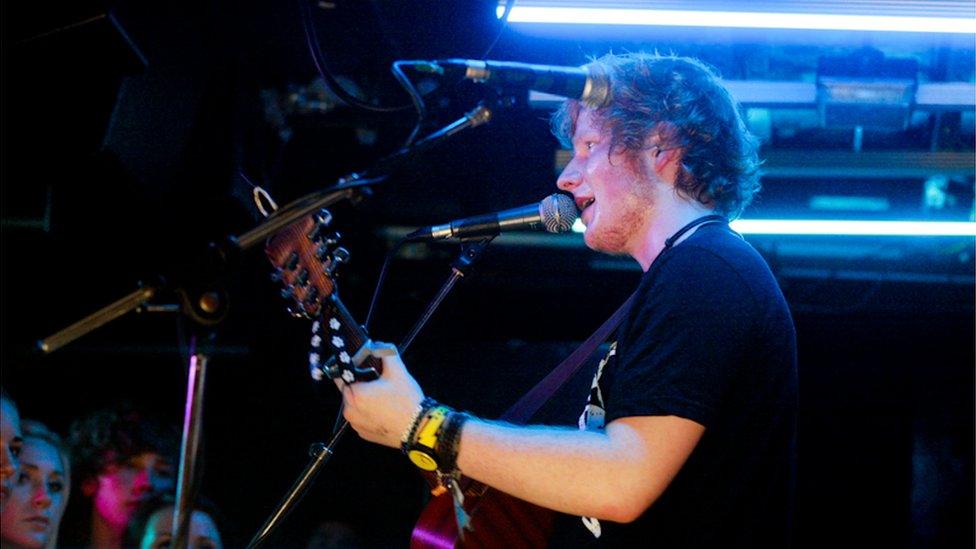
Ed Sheeran played the now-closed Moles in 2011, shortly before releasing his debut album
MVT estimates 35% of grassroots venues have closed over the past 20 years, citing venues such as Moles in Bath which closed in December after 45 years.
The loss of such venues threatens the lifeblood of the British music industry, say indie rock five-piece The Last Dinner Party.
The band, which topped the annual BBC Sound Of poll earlier this month, honed their sound in the depths of the pandemic - playing clubs and small venues between lockdowns, before emerging as one of the UK's most talked-about new acts.

BBC 6 Music at Independent Venue Week: Monday 29 January - Friday 2 February

Guitarist Lizzie Mayland told the BBC's Mark Savage the band are "really passionate" about fighting for local venues.
"That's where we got our start, and so many other amazing bands got their start. And if these places continue to fall, then there won't be new artists coming through and making a name for themselves," she says.
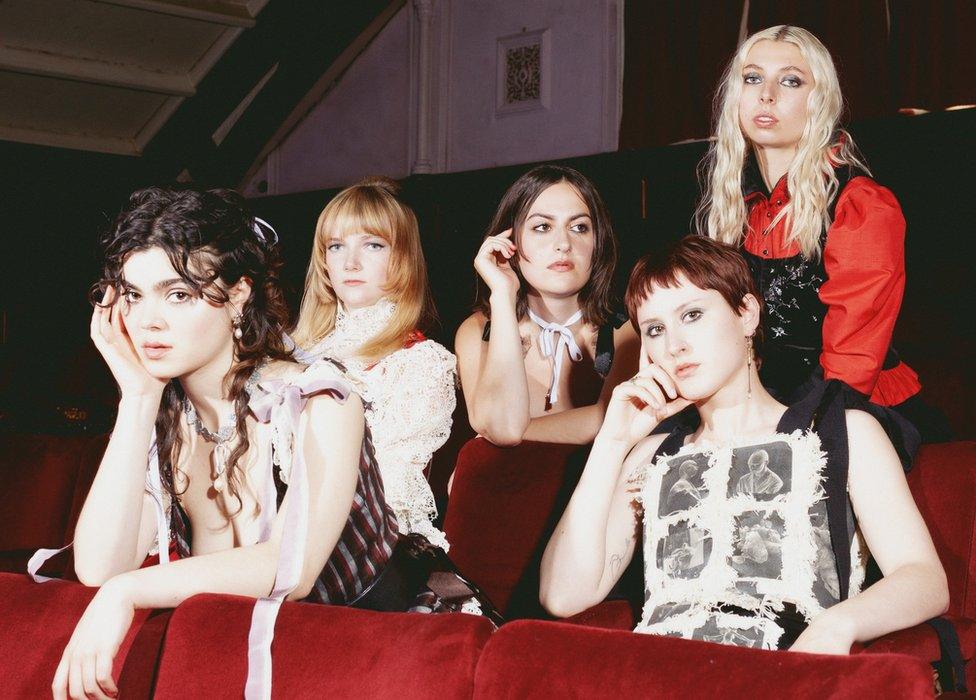
The Last Dinner Party (L-R): Abigail Morris, Emily Roberts, Aurora Nishevci, Lizzie Mayland and Georgia Davies
One such venue is the George Tavern, an historic pub in east London's Stepney Green.
Its owner Pauline Forster, herself an artist, has become a symbol of resistance in the increasing struggle facing grassroots spaces.
She successfully secured a rare protection order against noise complaints in 2019 - thanks, in part, to a celebrity campaign - but says current spiralling costs have reached "totally mad" levels.
"The electricity bill shot up 300%, from £12,000 to near £36,000 - and that's before heating," she told the BBC.
"Worse still, many insurers increasingly deem live music spaces 'high risk'. I've just paid £9,000 to insure," says Forster. "They think we're all going to go bust.
"So you're paying all this money - and pubs and small venues are still dropping like flies."
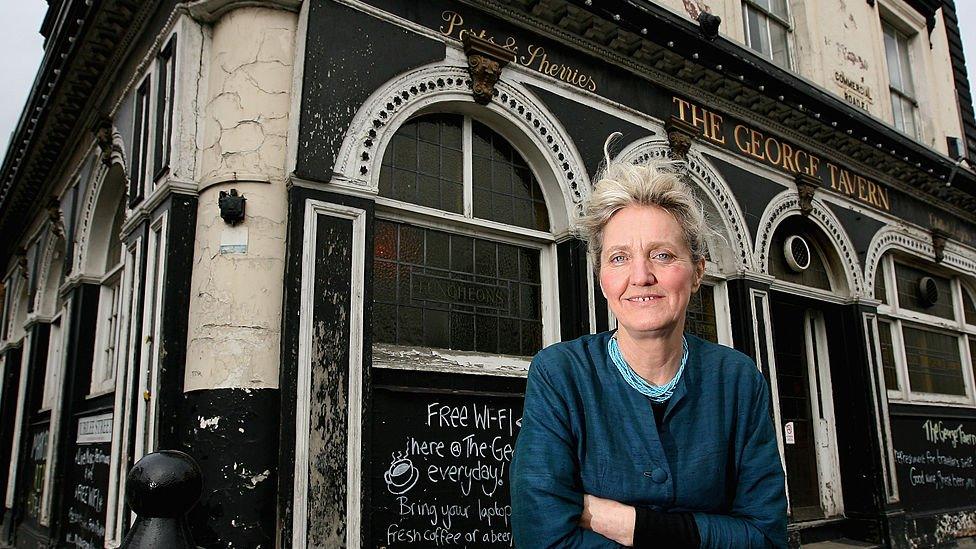
Pauline Forster, in 2008, when the George Tavern faced the risk of being turned into flats
Forster says venues, particularly those under rent agreements, urgently need VAT tax breaks and energy cost assistance - support that would recognise their contribution to British culture and the music industry.
"Without grassroots venues like The George to act as a birthing ground, how are bands like The Last Dinner Party going to be formed?" she says.
One reprieve for Forster, now 74, is that she owns the property outright, protecting her from unexpected rent spikes.
MVT sees property ownership as a potential way forward for small venues. Late last year, The Snug in Atherton, Greater Manchester, became the first grassroots gig venue to benefit from the Trust's 'Own Our Properties' plan.
Launched in May 2022, the project lets fans invest in threatened venues. MVT says "several" more purchases are planned in 2024.
Ticket levy
The Trust is also calling for arena-sized venues to invest a percentage of their ticket revenues into the grassroots sector, to help foster a new generation of artists - mirroring the FA's approach with Premier League clubs.
The charity wants to secure a £1 contribution to grassroots venues from every arena ticket sold by 1 January 2025. It awarded £282,546 directly to venues in 2023 and hopes to award £550,000 this year.
NME's news editor Andrew Trendell believes there should be "a legally mandated ticket levy on gigs at arena level and above".
"Rock band Enter Shikari had a ticket levy of their own and showed that it can be done with no extra cost to the consumer.
"France has already put in place laws for taxation that feeds back into the grassroots," he adds
"This is a matter of survival now. The government and the industry should stop thinking of excuses and save UK music.
"Lost venues will not be replaced," he warns, leaving "thousands of music fans without access to affordable live music".
"That means less young people inspired to start bands, less places for artists to hone their craft, less of the UK's world-leading live music workers getting their start, and a huge loss of the UK's cultural footprint."
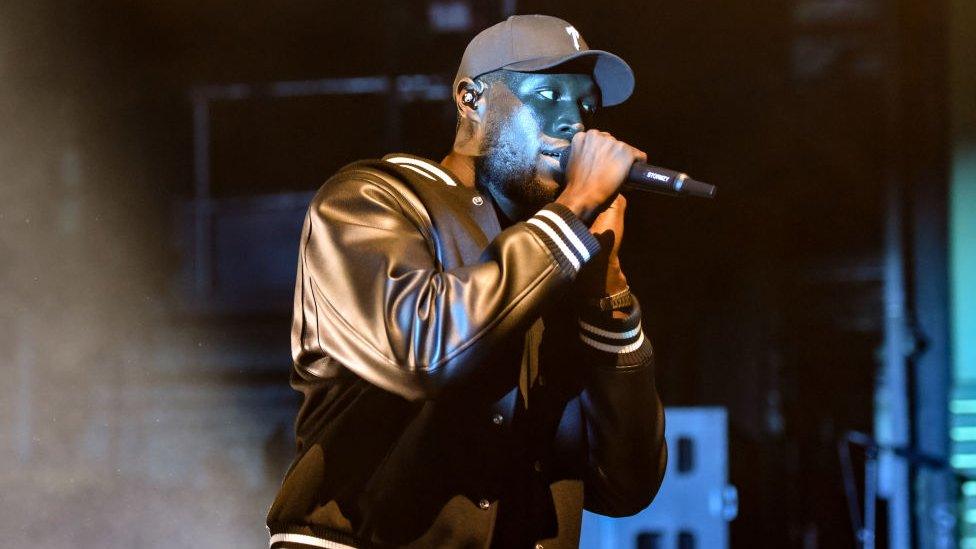
New Slang plays host to fledgling acts as well as major stars, such as Stormzy
In the TikTok and Spotify age, where algorithms increasingly dominate music discovery and traditional music press wanes, the power of sweaty, pulsing live music has arguably never been more vital.
"Of course it is about nurturing talent, but it shouldn't just be a stepping stone perspective," says Jon Tolley, co-owner of Kingston's Banquet Records store, external, and promoter of its New Slang gig night.
"Seeing a smaller band at a venue like the Fighting Cocks pub, playing to 100 people, is brilliant in, and of, itself," says Tolley, who has put acts from Wolf Alice to Stormzy within touching distance of fans for over two decades.
However, the current poor health of nightlife venues remains a challenge. Last week Rekom, the owners of the Pryzm nightclub chain, announced plans to call in administrators, potentially having an impact on Banquet, who host their larger New Slang shows at Pryzm's Kingston club.
In a statement posted on X, formerly Twitter, Banquet said they had been assured the site was safe for now but that precautionary alternative options were being explored.
Allow X content?
This article contains content provided by X. We ask for your permission before anything is loaded, as they may be using cookies and other technologies. You may want to read X’s cookie policy, external and privacy policy, external before accepting. To view this content choose ‘accept and continue’.
The label originally moved its gigs to the venue after the town's other major nightclub, the Hippodrome, was turned into flats. Should Kingston Pryzm also shut, it would mark the town's third nightclub closure in a decade - leaving Kingston's Rose Theatre as the only local large scale, accessible live music space.
"It's a further reminder on nightclubs - like record shops, gig venues, skate shops, books shops and so on - use them, or lose them," the statement concluded.
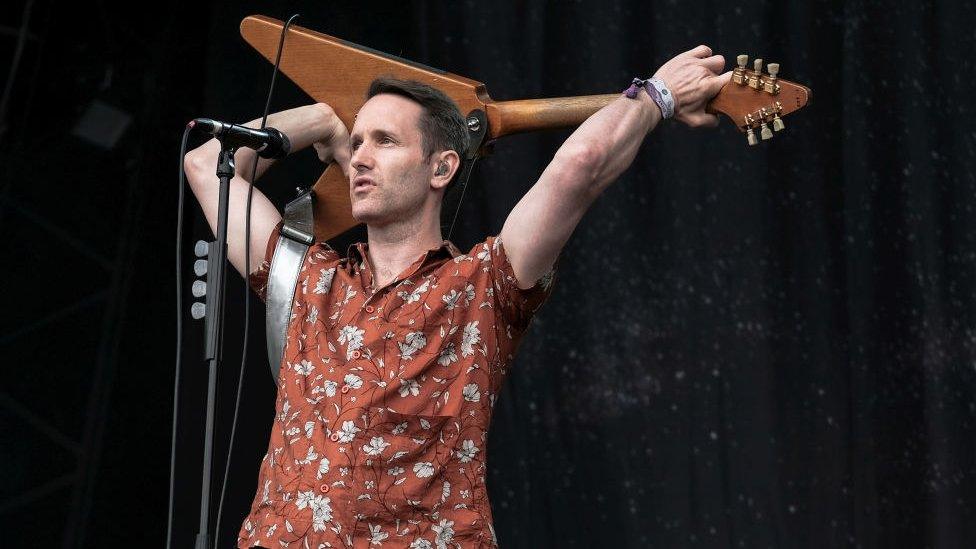
Northern Irish indie rock band Ash, led by singer and guitarist Tim Wheeler, will perform at BBC 6 Music's Independent Venue Week
This urgent ethos is the driving force behind Independent Venue Week, supported by BBC Radio 6 Music.
Next week, the station will once again take its tour bus around the UK, with Steve Lamacq and Huw Stephens broadcasting shows from a different independent venue each day.
Lamacq described the findings of the MVT's latest grassroots report as "frightening".
"If something isn't done soon, then we could lose another whole swathe of them in the next year," he continued.
Ash, who will perform at the Oh Yeah Music Centre in Belfast on Monday say "independent venues are the lifeblood of live music."
"It's where future festival headline bands are born. It's where chaos and creativity collide and it's so close you can maybe touch it.
"With indy venues, we have a whole world of musical possibilities. Without them, we have nothing."
Related topics
- Published5 December 2023
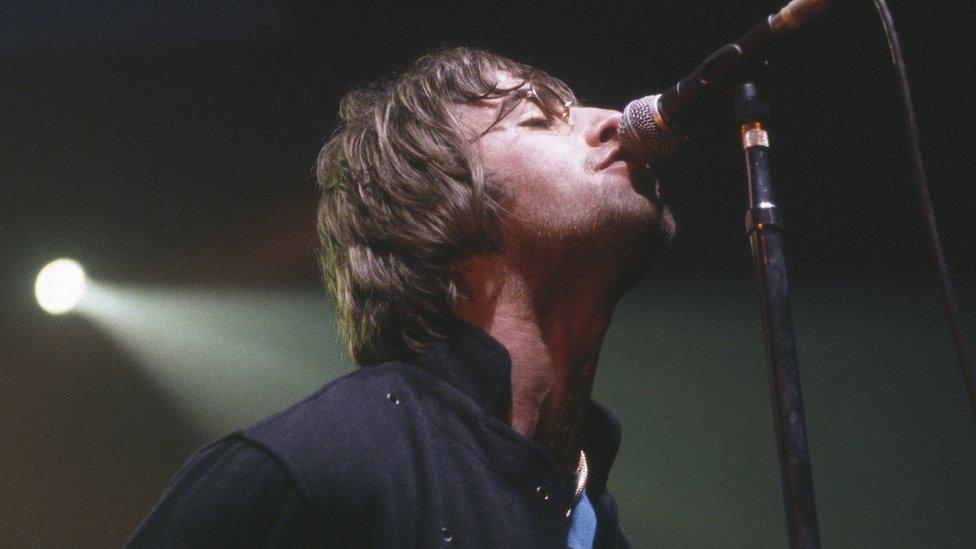
- Published15 January 2024

- Published4 February 2023
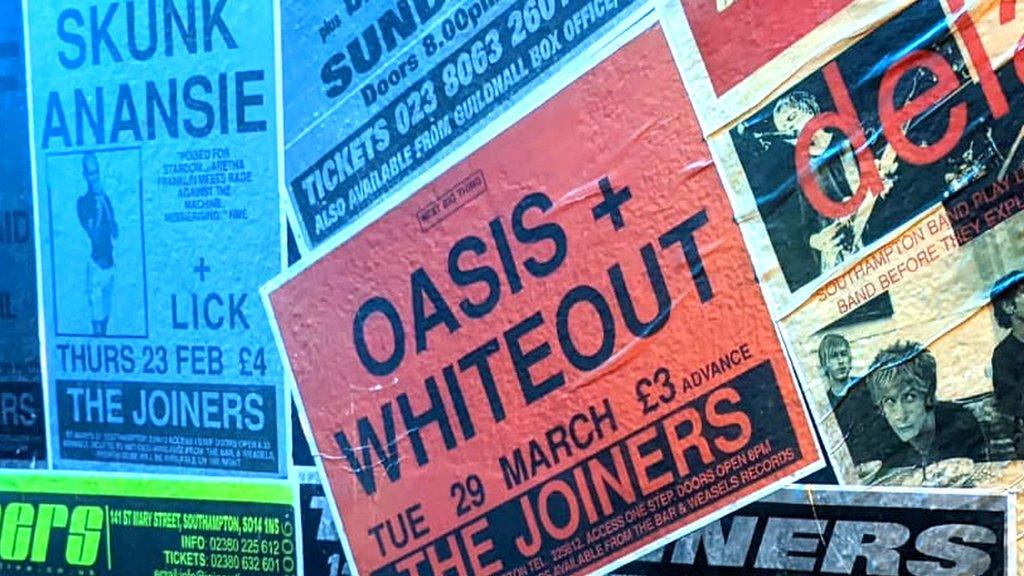
- Published31 January 2023
